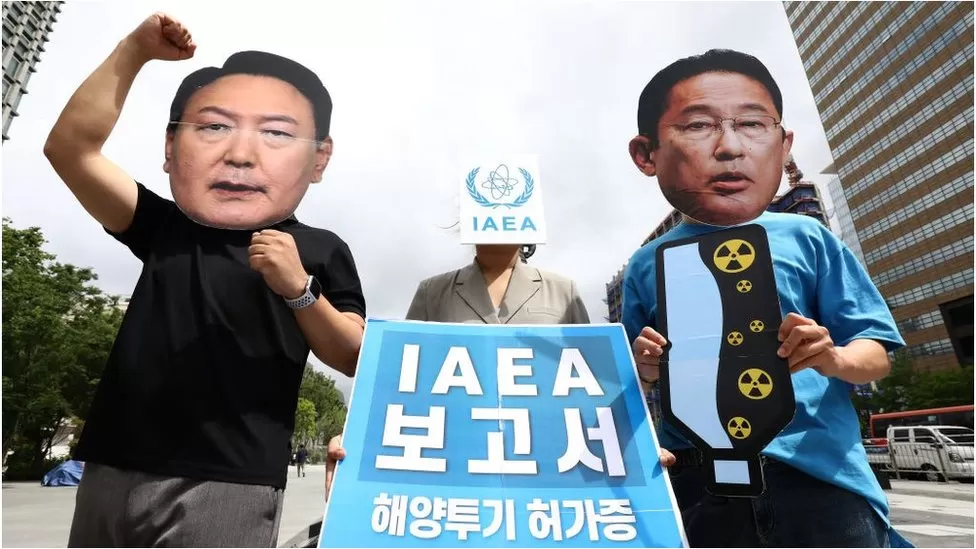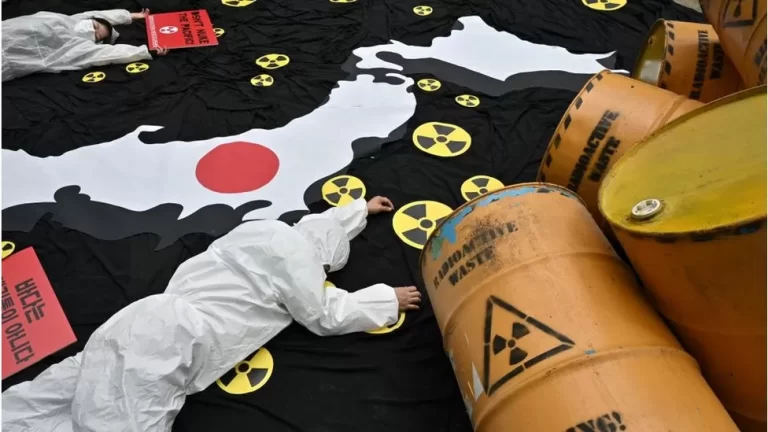Japan's controversial plan to release treated waste water from the Fukushima nuclear plant into the Pacific Ocean has sparked anxiety and anger at home and abroad.
Since the 2011 tsunami which severely damaged the plant, more than a million tonnes of treated waste water has accumulated there. Japan has said it will start discharging it from Thursday.
Despite an endorsement from the UN nuclear watchdog, the International Atomic Energy Agency (IAEA), the plan has been deeply controversial in Japan with local communities expressing concerns about contamination. Fishing industry groups in Japan and the wider region have also voiced concerns about their livelihoods, as they fear consumers will avoid buying seafood.
China has accused Japan of treating the ocean as its “private sewer”, and criticised the IAEA of being “one-sided”. While South Korea's government has said it has no objections to the plan, many of its citizens are opposed to it.
So what is Japan's plan and how exactly has it churned the waters?
What is Japan doing with the nuclear waste water?
Since the disaster, power plant company Tepco has been pumping in water to cool down the Fukushima nuclear reactors' fuel rods. This means every day the plant produces contaminated water, which is stored in massive tanks.
More than 1,000 tanks have been filled, and Japan says this is not a sustainable long-term solution. It wants to gradually release this water into the Pacific Ocean over the next 30 years, insisting it is safe to be discharged.
Releasing treated waste water into the ocean is a routine practice for nuclear plants – but given that this is the by-product of an accident, this is no ordinary nuclear waste. Tepco filters the Fukushima water through its Advanced Liquid Processing System (ALPS), which reduces most radioactive substances to acceptable safety standards, apart from tritium and carbon-14.
Tritium and carbon-14 are, respectively, radioactive forms of hydrogen and carbon, and are difficult to separate from water. They are widely present in the natural environment, water and even in humans, as they are formed in the Earth's atmosphere and can enter the water cycle.
Both emit very low levels of radiation but can pose a risk if consumed in large quantities.
The filtered water goes through another treatment, and is then diluted with seawater to reduce the remaining substances' concentrations, before it is released into the ocean. Tepco says its system of valves will ensure no undiluted waste water is accidentally released.
Japan's government says the final level of tritium – about 1,500 becquerels per litre – is much safer than the level required by regulators for nuclear waste discharge, or by the World Health Organization for drinking water. Tepco has said the carbon-14 level would also meet standards.
Tepco and the Japanese government have conducted studies to show the discharged water will present little risk to humans and marine life.
Many scientists have also backed the plan. “The water released will be a drop in the ocean, both in terms of volume and radioactivity. There is no evidence that these extremely low levels of radioisotopes have a detrimental health effect,” said molecular pathology expert Gerry Thomas, who worked with Japanese scientists on radiation research and advised the IAEA on Fukushima reports.
What do critics say?
UN-appointed human rights experts have opposed the plan, as have environmental activists. Greenpeace has released reports casting doubt on Tepco's treatment process, alleging it does not go far enough in removing radioactive substances.
Critics say Japan should, for the time being, keep the treated water in the tanks. They argue this buys time to develop new processing technologies, and allow any remaining radioactivity to naturally reduce. There are also some scientists who are uncomfortable with the plan. They say it requires more studies on how it would affect the ocean bed and marine life.

“We've seen an inadequate radiological, ecological impact assessment that makes us very concerned that Japan would not only be unable to detect what's getting into the water, sediment and organisms, but if it does, there is no recourse to remove it… there's no way to get the genie back in the bottle,” marine biologist Robert Richmond, a professor with the University of Hawaii, told the BBC's Newsday programme.
Tatsujiro Suzuki, a nuclear engineering professor from Nagasaki University's Research Center for Nuclear Weapons Abolition, told the BBC the plan would “not necessarily lead to serious pollution or readily harm the public – if everything goes well”. But given that Tepco failed to prevent the 2011 disaster, he remains concerned about a potential accidental release of contaminated water, he said.
What have Japan's neighbours said?
China has demanded that Japan reaches an agreement with regional countries and international institutions before it releases the water.
Beijing has also accused Tokyo of violating “international moral and legal obligations”, and warned that if it proceeded with the plan, “it must bear all consequences”. The two countries currently have a prickly relationship, with Japan's recent military build-up and China's provocative moves around Taiwan raising tensions.
Tokyo has engaged in talks with its neighbours, and hosted a South Korean team of experts on a tour of the Fukushima plant in May. In contrast to China, Seoul – which has been keen to build ties with Japan – has soft-pedalled its concerns. It says it “respects” the IAEA's findings and has endorsed the plan. But this approach has angered the South Korean public, 80% of whom are worried about the water release according to a recent poll.
“The government enforces a strong no-littering policy at sea… But now the government is not saying a word (to Japan) about the wastewater flowing into the ocean,” Park Hee-jun, a South Korean fisherman told BBC Korean.
“Some of the officials say we should remain quiet if we don't want to make consumers even more anxious. I think that's nonsense.” Thousands have attended protests in Seoul calling for government action, as some shoppers fearing food supply disruptions have stockpiled salt and other necessities.
In response, South Korea's parliament passed a resolution in late June opposing the water release plan – though it is unclear what impact this would have on Japan's decision. Officials are also launching “intense inspections” of seafood, and are sticking to an existing ban of Japanese seafood imports from regions around the Fukushima plant.
To assuage the public's fears, prime minister Han Duck-soo said he would be willing to drink the Fukushima water to show it is safe, while one official said last week that only a small fraction of the discharge would end up in Korean waters. Elsewhere in the region, several island nations have also expressed concerns with the Pacific Islands Forum regional group calling the plan another “major nuclear contamination disaster”.
How has Japan responded?
Japanese authorities and Tepco have sought to convince critics by explaining the science behind the treatment process, and they would continue to do so with “a high level of transparency”, promised prime minister Fumio Kishida.
In materials published on its foreign affairs ministry website, Japan also pointed out that other nuclear plants in the region – particularly those in China – discharge water with much higher levels of tritium. The BBC was able to verify some of these figures with publicly available data from Chinese nuclear plants.
But the biggest vindication may lie with the IAEA report, released by the agency's chief Rafael Grossi while visiting Japan in July. The report, which came after a two year investigation, found that Tepco and Japanese authorities were meeting international safety standards on several aspects including facilities, inspections and enforcement, environmental monitoring, and radioactivity assessments.
Mr Grossi said the plan would have a “negligible radiological impact on people and the environment”. Yet, Japan's decision to start discharging the Fukushima water has set the stage for an intensified showdown with its critics.
— CutC by bbc.com


